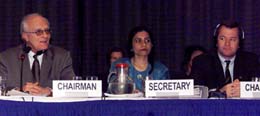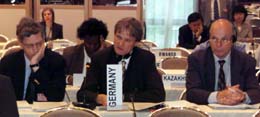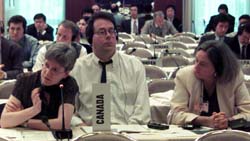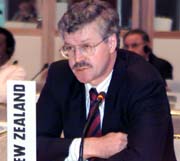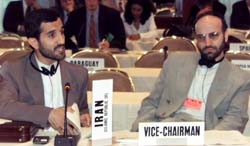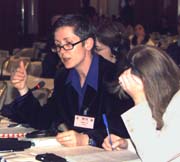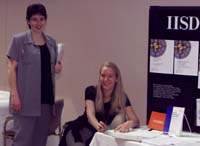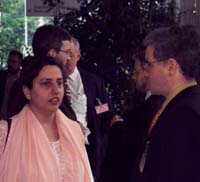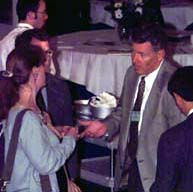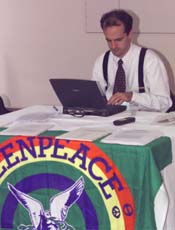|
UNFCCC
Subsidiary Bodies SBI-10 and SBSTA-10 |
||
|
|
|
|
LULUCF negotiations
stumble over sequencing of work programme Negotiators held their first discussions on 'Draft Conclusions' on methodological issues related to LULUCF (decision 1/CP.3, paragraph 5(a) ). They also considered a table of questions on policy and procedural issues proposed for consideration before COP-6. The questions deal with clarification of definitions, eligibility of additional activities, rules governing the use of approved activities and inventory and reporting guidelines. The prospect of a convergence of views emerged with the introduction, by Australia, of a draft 'process flow chart', setting out proposals for a schedule, which includes plans for a SBSTA Expert Workshop on the Draft IPCC Special Report. The IPCC has indicated that this could take place on the eve of COP-5. Informal discussions continued in the corridors and during the UNFCCC Executive Secretary's wine reception in the evening. SBSTA
agrees terms of reference for Expert Workshop on adverse effects
arising from the implementation of measures to address climate change
SBSTA-10 agreed terms of reference for an 'Expert Workshop' in September following informal consultations co-ordinated by Mohammad Reza Salamat (Iran) on behalf of the SBSTA and SBI Chairs. The mandate for the Workshop originated in COP-4 decision (5/CP.4) to advance work on Convention Articles 4.8 and 4.9 and Kyoto decision 3/CP.3 and Articles 2.3 and 3.14. The outcome of the Workshop will be considered at SBSTA-11 and provide methodological input to facilitate further consideration of Convention Articles 4.8 and 4.9. SBSTA Chair Kok Kee Chow (Malaysia) said that implementation of the Convention Articles is an integral part of the Buenos Aires Plan of Action. The terms of reference indicate that the four-day Expert Workshop, expected to take place in Bonn during the second half of September this year, will deal with: i. The identification of factors that will help determine the adverse effects of climate change and the impacts of implementation of response measures; ii. Identification of information available and information gaps, including the specific needs and concerns of developing country Parties; iii. The specific needs of the least developed countries; iv. And Issues raised in national submissions. During
the informal consultations, involving friends of the SBSTA and SBI
Chairs, from the G-77/China, JUSSCANZ, country Parties with economies
in transition and the European Community, OPEC countries worked
hard to secure an acceptable schedule for day three of the Workshop.
Day three will deal with: minimizing adverse effects of the implementation
of response measures on: a. international trade, and social, environmental
and economic impacts on developing country Parties identified in
Article 4.8 and 4.9 of the Convention; and b. countries whose economies
are highly dependent on income generated from the production, processing
and export, and/or on consumption of fossil fuels and associated
energy-intensive products.
|
| Photos and RealAudio from 4 June | |
|
|
|
On technology transfer, Jeff Seabright (USA) endorsed the plan for the consultation process and announced that the US Government will provide US$150,000. |
|
|
Germany, of behalf of EU, recalled a COP-4 decision underlining the importance of the framework for meaningful and effective actions to enhance implementation of Article 4.5 of the Convention on technology transfer. He announced that the Netherlands will contribute US$50,000 to a regional workshop in Africa. He also announced contributions from the French and German governments. | |
|
|
|
| |
|
|
|
|
Canada called for a regime tailored to the Kyoto Protocol, as it differs from other multilateral environmental agreements. |
|
|
| |
|
|
|
|
Iran noted that Protocol Article 18 (non-compliance) does not specify any particular articles, but applies to the entire Protocol. He called on the COP to create a specific body for non-compliance and said an expert review team does not have the authority or capacity to determine non- compliance. |
|
|
Australia said a distinction between binding and non-binding aspects would be necessary for practical reasons and stressed the usefulness of peer reviews, rather than a punitive regime, to enforce obligations. | |
| |
|
John Palmisano, Enron International, spoke on reducing risk in early CDM project development. |
|
|
| |
|
Above and below: Conference participants enjoy the Executive Secretary's reception. On the left, a contingent from the Pacific region enjoy the break from the negotiations. |
|
|
| |
| |
|
Victoria Kellett and Tina Winqvist staffing the International Institute for Sustainable Development's information stand in Bonn. |
|
|
Preeti Soni from the Tata Energy Research Institute, New Delhi, chats with Peter Doran, ENB. | |
|
Delegates confer after the meeting of the Africa Group. |
|
|
Conference participants in discussion in the lobby of the Maritim. | |
|
Bob Watson, IPCC Chair, in the corridors with members of the Umbrella Group after a meeting on land use, land-use change and forestry. |
|
|
Greenpeace Legislative Director Gary Cook hard at work at the Greenpeace information stand. | |



